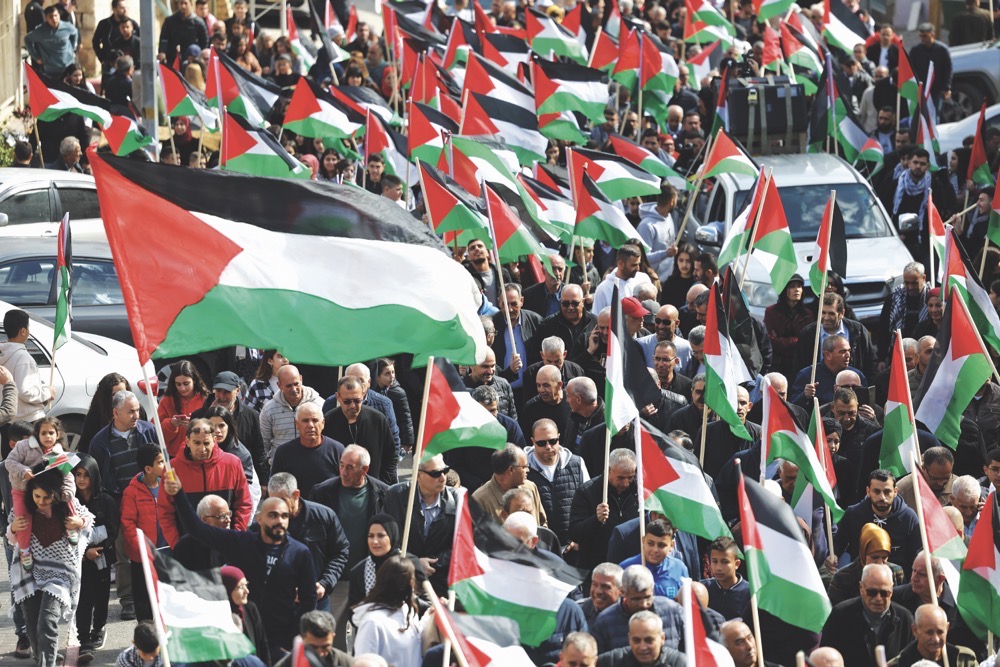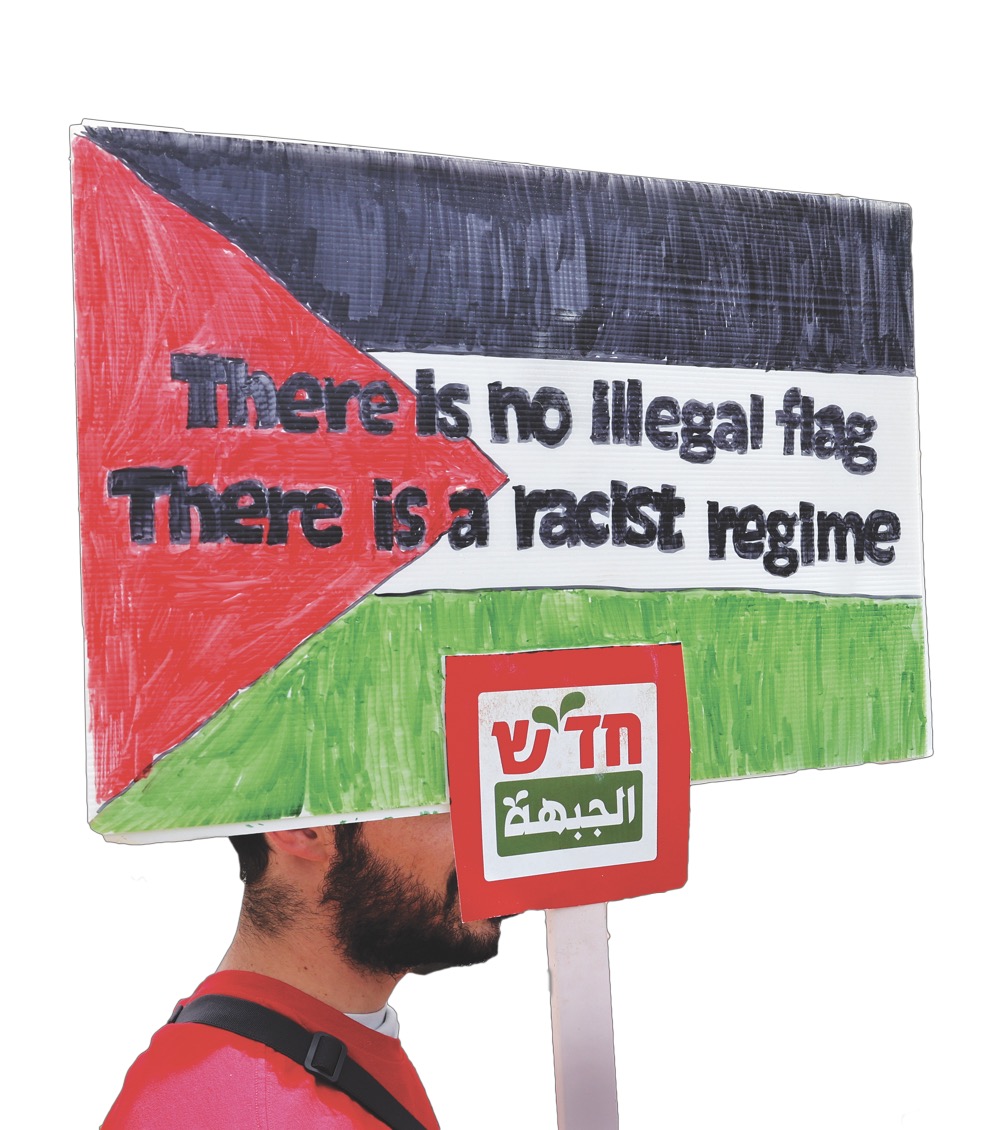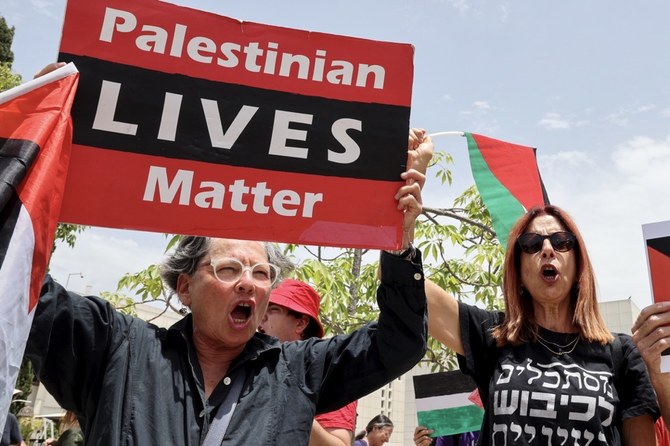DUBAI: On Monday, despite months of massive pro-democracy protests across the country, Israeli lawmakers voted to implement a key element of what proponents have long called “judicial overhaul.”
While the decision met with immediate backlash from various segments of Israeli society, political analysts say that these new limitations on judicial power may serve to eliminate the very few, and often painfully insufficient, means by which Arab citizens of Israel can pursue justice in the country.
Prominent opposition politicians have also warned Palestinian Arab citizens of Israel about the ramifications of what they view as the decay of democracy in the country. During a march commemorating Land Day in March this year, Knesset member Aida Touma-Suleiman, from the Democratic Front for Peace and Equality Party, said Arabs “are going to be hurt the most from these reforms.”
While any country’s Supreme Court is supposed to act as the blind enforcer of justice and strike down laws that are discriminatory or violate human rights, “this does not mean the Israeli courts have been fair to the Arabs,” Palestinian author and commentator Ramzy Baroud told Arab News.

Land Day protests commemorate the events of March 30, 1976. (AFP)
“To the contrary, most of the discriminatory laws, passed by the Israeli Knesset for decades, have been challenged by Arab and pro-Arab civil society and legal organizations and litigated. Yet, every one of these laws (has) been validated by Israeli courts, including the Supreme Court itself.”
Baroud pointed out that the Supreme Court upheld Israel’s Nation-State Law of 2018 declaring Israel a Jewish nation by law, “degrading the rights of Arab and other minorities, including their culture, historical claims, and language.”
The latest changes, introduced in January by Israeli Justice Minister Yariv Levin, are wide-reaching: The government will gain full control of the appointment of Supreme Court justice; courts will not be allowed to hear arguments against the country’s Basic Laws, which serve as Israel’s constitution; and Supreme Court decisions that nullify laws can be overridden by the Knesset, Israel’s parliament, after a reintroduction and majority vote for approval.
Though the reform process was paused in late March to allow for dialogue, the government and various opposition parties were unable to reach a compromise. On July 24, the section of the reform package that canceled the “reasonableness clause,” a mechanism which allowed the country’s Supreme Court to nullify government decisions that it felt were not reasonable or went against public interest, was passed.
In a country such as Israel, where the legislative and executive branches are ruled by the same governing coalition, the judiciary is one of the only powers able to stand against complete subjugation of the government by the former two branches.
“If you have three branches and two are close together, you’re left with the judicial to ensure that the government is not taking complete control and taking liberties. This is why Israelis understand, many Israelis understand, that what the government is trying to do is ensure that most of the power is in the hands of the government,” Yossi Mekelberg, professor of international relations and an associate fellow of the MENA Program at Chatham House, told Arab News.

Benjamin Netanyahu at the Knesset. (AFP)
“It’s moving toward a very authoritarian type of government … if you look at the character, it’s Orthodox, it’s religious Zionism, you can envisage the direction that this will take.”
The reason for the massive outcry against the so-called judicial overhaul, according to Baroud, is that it has the potential to affect more than just minority groups in Israel.
“The current ‘crisis’ in Israel was instigated by the fact that the Israeli government is now manipulating Israeli laws to ensure its superiority over other Israeli Jewish groups — not just the country’s minorities. When this practice was used against Arabs for generations, it didn’t seem to bother most Israelis,” he said.
“When most Israelis become the victims of the misuse of political majority (in) the parliament, they are now protesting en masse.”
INNUMBERS
• After the 1947-1949 war, around 150,000 Palestinians remained inside of what became Israel’s borders.
• Today, there are approximately 1.6 million Palestinian citizens of Israel.
• Total Israeli population, including Jews and Arabs, stands at 9.18 million.
Baroud said that while Israel’s Supreme Court often upheld discriminatory laws, it did occasionally “strike down proposed Knesset laws as illegal, especially when they seemed outlandishly racist, for example.”
In 2006, the Supreme Court ruled Amendment No. 7, which granted the state immunity from compensation claims from Palestinians injured by Israel’s security forces, null and void.
Three years ago, it struck down the Judea and Samaria Settlement Regulation Law, which would essentially legitimize illegal settlements on Palestinian-owned land in the West Bank, and a year later, it froze an amendment which would see parents of Palestinian minors convicted of security-related offenses denied social benefits from the state.
While the future of Arabs in Israel was already far from bright, the extreme limitations on the Israeli judiciary may remove the final legal avenue Arabs have to fight for their rights.
“This will not be possible in the future, now that it is the Knesset itself that plays the role of the monitor of the courts, as opposed to the other way around. Palestinian rights advocates inside Israel are already warning against the worsening of an already bad situation in terms of Arab civil, legal and political rights in Israel as a result of the changes underway,” Baroud said.

A protest at the Tel Aviv University campus. (AFP)
“This does not mean that Palestinians have any illusions about the devastating role played by Israeli courts to validate Israel’s selective democracy. But they are aware that things can, and will, become even worse.”
Baroud’s concerns are shared by Osama Al-Sharif, an Amman-based journalist and political commentator, who believes “the outlook is pretty bleak for Israeli Arabs as the state becomes more ultra-nationalist and ultra religious.”
He mentioned that just a day after the cancellation of the reasonableness clause, the Knesset approved an expansion of the Admissions Committees Law, allowing small communities within Israel to practice discrimination when providing housing.
The law, passed in 2010 as a loophole to a Supreme Court ruling banning discrimination on the basis of race, religion, or nationality when selling land, allowed communities to reject applicants they found “unsuitable to the social and cultural makeup” of the community.
Initially only applied to communities of up to 400 families in certain regions, the expansion approved on Tuesday will henceforth empower admissions committees in many more regions, for communities of up to 700 families, and will allow the law’s application to even larger communities after five years.

Israeli security forces break up a sit-in outside the Knesset in Jerusalem, below, on the eve of the judicial overhaul. (AFP)
“This is a discriminatory law and is aimed at keeping Arab citizens of Israel in ghettos that lack basic services and now suffer from lawlessness,” Al-Sharif told Arab News.
While there has been Arab participation in the Israeli protest movement, with 200 politicians, professionals, intellectuals, and artists signing a petition against the reforms in February, overall Arab participation had been low, according to an April report by the BBC.
Though many Arab citizens of Israel may see the government’s democratic backsliding as a solely Jewish issue, others warn that it will have severe consequences for minorities.
“If this trend continues, it will just make it worse,” Chatham House’s Mekelberg said. “The government will do whatever it likes. If in certain cases they back Palestinians, this will disappear. In the government we experience now, elements of that would like to annex the entire West Bank, or at least parts of the West Bank.”

















